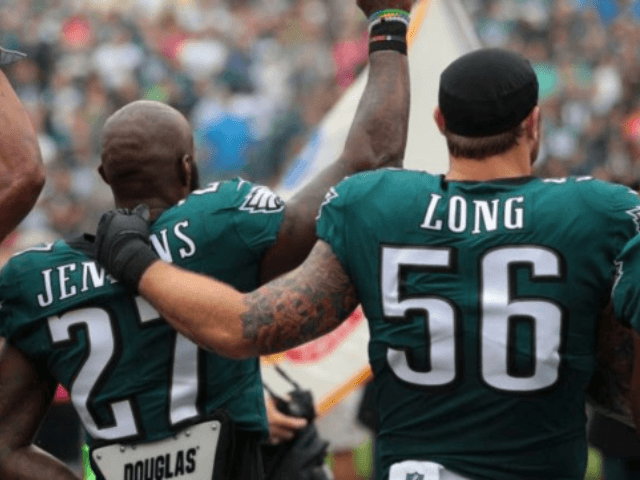One platform issue for the NFL Players’ Coalition, a group representing the anthem protest movement, is sentencing reform. On June 8, President Donald J. Trump asked the group for suggestions on people he should pardon.
“I’m going to ask them to recommend to me people that were unfairly treated … friends of theirs or people that they know about, and I’m going to take a look at those applications.”
And if it’s uncovered “that they’re unfairly treated, then we will pardon them or at least let them out,” the president said.
On June 21, coalition members Doug Baldwin, Malcolm Jenkins, Benjamin Watson and Anquan Boldin, responded to President Trump by penning a New York Times Op-Ed. In the piece, the players wrote, “a handful of pardons will not address the sort of systemic injustice that NFL players have been protesting. These are problems that our government has created, many of which occur at the local level. If President Trump thinks he can end these injustices if we deliver him a few names, he hasn’t been listening to us.”
In his June 25 column, noted Sports Illustrated NFL writer Albert Breer praised the players for their “crafty” response to the president.
“[Shout-out] to Doug Baldwin, Anquan Boldin, Malcolm Jenkins and Benjamin Watson, for finding a crafty way to answer the President’s request—and ask for pardons for larger groups of people, not just individuals. So much of what they wrote is in simple, common-sense terms. And no matter where your political feelings are, what’s great about what this group of players has been doing is that they’ve taken the collateral gained from the protests of the last two years and smartly leveraged it to accomplish their goals, which doesn’t always happen in these situations.”
Some might ask, “What goals have they accomplished?”
Did Trump say he’d pardon “larger groups of people?”
He’s been issuing pardons on a case-by-case basis, like on June 6, when he commuted the sentence of Alice Johnson, a 63-year-old Tennessee woman, who was serving life in prison, since in 1996, on non-violent drug charges.
Bolden wants this done on a wholesale basis.
“Mr. President please use your pardon and platform to change lives of thousands by issuing categorical pardons for those who received death-in-prison punishments and have already served lengthy sentences for non-violent drug crimes @realDonaldTrump #justice,” Boldin tweeted on the same day as the New York Times story.
This wish might be a longshot considering the President thinks current sentences for drug dealers might not be strong enough.
During a March 22 panel discussion in Washington on the nation’s drug epidemic, Trump said, “These people [drug dealers] are poisoning thousands of people over the course of their lives through drugs. So we’re going to have to get much, much tougher in terms of penalty. And if you want to stop it — if you look at certain countries where they have, as an example, the death penalty, and say, ‘How’s your drug problem?’ And they will tell you, ‘We don’t have much of a drug problem.’ ”
So the request of Boldin and the NFL Player’s Coalition, for thousands of pardons, might be a tough goal to accomplish.

COMMENTS
Please let us know if you're having issues with commenting.